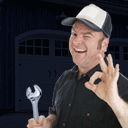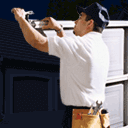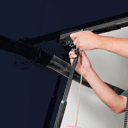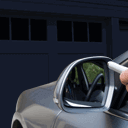Having Garage Door Troubles? Here’s What to do
 Is your garage door not opening? After opening and shutting thousands of times over many years, it’s bound to need some attention. There are many reasons for garage door difficulties. Let’s look at some of the most likely possibilities and solutions.
Is your garage door not opening? After opening and shutting thousands of times over many years, it’s bound to need some attention. There are many reasons for garage door difficulties. Let’s look at some of the most likely possibilities and solutions.
Simple Issues
Does your garage door opener run a few seconds, but then turn off? If your garage door still doesn’t move, the door is shut and the door motor is trying but failing to lift the door. Examine the springs. If that isn’t it, check the track for obstacles. If neither of these is the problem, then see if your garage door has a built-in lock that’s engaging by mistake. This commonly occurs with older garage doors.
Does your garage door not shut at all? Your garage door has a photo eye on either side, and between the two is an invisible beam, which, when broken, stops the door from closing. Check to see if these sensors have become dirty or misaligned.
Check your transmitter batteries. Maybe they just need to be replaced, and that’s all you have to do.
Does the garage door opener run, but the garage door doesn’t move at all? In case of a power failure, your garage door opener comes with a disconnect switch that allows you to manually open or shut your garage door. This switch is attached to a knob or rope, which can come unhooked. Shut or open the door manually all the way, and then reattach the hook securely. Then, using the transmitter, attempt to open or close the garage door again. It should work fine now.
Does the garage door go down all the way, but then open up again? The open-and-close limit settings of your garage door opener are likely on the blink. These settings tell the garage door opener how far the garage door should move prior to being fully shut. If the settings are too high, the door will touch the ground before the opener decides it should, assuming the door is touching something in its path. It will automatically reverse, to keep from smashing it. Read the manual for how to set the open-and-close limits.
Does your garage door open and shut at random? If the door’s opening or shutting by itself, even when you’re away, that’s not safe. The solution may simply involve checking the transmitters. Make sure they’re not stuck under an object that could inadvertently depress the control mechanism. For instance, the transmitters may be under some items you left in your vehicle, or somewhere else close by. Also examine the transmitters’ frequency. A neighbor may have exactly the same frequency as yours.
Complicated Issues
What if your garage door shuts quickly, with a bang? You could have a broken tension spring, which should be countering the weight of the door. Or, the cables connected to the tension spring might be broken. Either problem may be dangerous. Hire a garage door professional.
What if your garage door shuts just part way, yet opens again? A garage door is designed with a reversing mechanism to stop it from crushing an object in its path. The reversing instruction is triggered by any object on the ground blocking the garage door’s path, such as a box, toy, garbage can, or bike. But also there could be a buildup of debris on the garage door tracks ~ dirt, a tiny object, or gum ~ which will prevent the rollers from going forward. This is a bad problem, requiring professional attention.
Your garage door track may be out of alignment. This is serious. The metal track of your garage door must be correctly aligned, or it won’t budge. Look for any bends in the rails, or any gaps between the rollers and the rail. The garage door’s weight can compound these issues as time passes, so don’t put it off, because the door can become dangerous. Contact a professional.
If your garage door doesn’t open at all, it’s highly likely that it’s a garage door spring malfunction. Your garage door may come with one or two torsion springs. If either of these springs is broken, the door may fail. If so, then it’s time to hire a professional for repair or replacement.
Don’t adjust your own garage door, unless you’re an engineer! If not properly serviced, a garage door spring can cause injury or even death. The garage door cables, bottom brackets, and drums, may also require adjusting. Hire a local legitimate professional garage door repair company. If you are located in Centennial, Colorado, consider a trustworthy company such as Centennial Garage Door Repair.
Prevent Future Garage Door Problems
Stick to a regular garage door maintenance schedule. It’s wise to keep your garage door in tiptop shape to extend its life. Particularly if your garage doubles as a shop, office, or game room, you must keep it very well-maintained.
Keep your garage door rollers, springs, and hinges lubricated ~ at least annually, before the winter comes. Without lubrication, the springs will eventually rust, and the coils will bind. Use a reputable brand, so it won’t dry out. All you need is a light coating.
About once a month, examine the components of your garage door system. If you find any worn parts, replace them. Tighten any loose bolts. If you notice any odd noises when your garage door opens and shuts, be sure to investigate.
Schedule an annual inspection with a reputable local garage door repair company. Cables, pulleys, springs, and wires require extra attention by a professional technician.
Every other year, clean your garage door to make it last longer. Wash it on both sides with a sponge and some mild dish soap and water. Rinse it well. Don’t neglect the garage door opener sensor eyes; wash them too, with a dry, clean cloth. Keep the area around the sensors free of dirt and cobwebs. If you have a steel garage door, apply car wax for cold-weather protection. If you have a wood garage door, at the first signs of chipping or peeling, apply a coat of paint.
Garage door maintenance doesn’t take much effort, and the little time it takes is certainly worth it. You will spend a lot less on any repairs that may arise, and you aren’t likely to have to replace it for a good many years.
Garage Door Articles
- Door closure problems
- Cold Weather Problems With Garage Doors
- Why A Garage Door Won't Stay Open – And What To Do
- Having Garage Door Troubles? Here’s What to do
- Garage Door Won’t Open or Close with Remote Control
- Identifying Garage Door Spring Issues
- The best ways to extend the life of your Garage Door
- Garage Door won’t open or close with remote control
- Why You’re Garage Door Might Not Open
- Garage Door Maintenance
- How to Find a Good Garage Door Service








